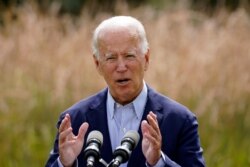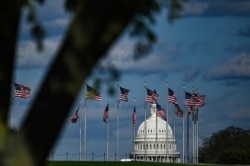As President-elect Joe Biden prepares to take over the White House from President Donald Trump, experts anticipate a near-complete reversal on climate policy.
The Trump years have been marked by loosening regulations on fossil fuel producers, lowering efficiency standards for vehicles and appliances and disdain for international climate agreements. Even while dismissing climate change as a “hoax,” Trump has repeatedly boasted that “From day one, my administration has made it a top priority to ensure that America has among the very cleanest air and cleanest water on the planet.”
Biden, on the other hand, has named climate change one of the top priorities his administration will address immediately upon taking office.
The president-elect campaigned on a $1.7 trillion plan to transition to 100% clean energy sources by 2050. It is an approach that would permeate nearly every aspect of government and the economy with measures to gradually reduce greenhouse gas emissions that contribute to global warming.
But he will likely face resistance. While his Democratic party controls the House of Representatives, control of the Senate — currently in Republican hands — hangs on a January runoff election in Georgia involving two Senate seats where Republicans are favored.
President Trump has also appointed scores of conservative judges to federal courts across the country, including the Supreme Court, who will likely be skeptical of increasing government regulations.
The Biden administration still has levers to pull, experts say. Here are four.
Use the whole government
Many experts expect Biden to infuse climate change into just about everything the government does.
That begins with the State Department, where Biden is expected to rejoin the 2015 U.N. Paris climate agreement immediately.
The Environmental Protection Agency and Department of Energy will resume their focus on reducing greenhouse gases.
But climate change will likely show up in other agencies' agendas as well. The Department of Agriculture, for example, may do more to promote ways that farmers, ranchers and foresters can use natural systems to store carbon.
"That could really move the needle on climate and also help expand the set of stakeholders that see climate progress in their strategic interest," said Sasha Mackler, energy project director at the Bipartisan Policy Center.
Trump's Interior Department opened up federal land to fossil fuel development. Biden is expected to reverse that trend, not only restricting oil and gas drilling but opening up land for renewable energy.
"Where the agencies that lease the land for those projects place their energies matters," noted Joseph Majkut, director of climate policy at the Niskanen Center, a Washington-based policy research institute.
Biden also will probably pick climate hawks to staff key regulatory bodies, he noted, including the Federal Energy Regulatory Commission and the Securities and Exchange Commission.
"There's going to be a push for the SEC to establish disclosure requirements for publicly traded companies that will force them to measure their exposure to the risk of climate change and the risk of climate change policies," environmental lawyer Kyle Danish with Van Ness Feldman told the Center for Strategic and International Studies' Energy 360 podcast.
Also, "expect the government to use the power of the purse," Danish added.
For example, government-funded construction projects buy a huge amount of the concrete sold in the United States. If the government were to impose carbon-footprint requirements on building materials, "that could drive potentially significant supply chain emission reductions," he said.
Roll back the rollbacks
One of the most significant ways the Biden team will have an impact is by simply not defending Trump's rule changes.
Many of Trump's most significant climate-policy rollbacks are facing legal challenges.
Nearly half of U.S. states sued the Trump administration for loosening rules governing vehicle efficiency standards and withdrawing California's ability to set stricter standards.
Twenty states sued over relaxed rules on emissions of methane, a potent greenhouse gas, from the oil and gas industry.
"It's not too difficult to nullify and replace rules that are still being litigated," said David Bookbinder, chief counsel at the Niskanen Center.
Trump's team withdrew and revised several contested Obama administration rules, he noted, including the vehicle efficiency standards that are back in court now.
Stricter regulations
With control of Congress likely divided, Biden will face the same challenge passing sweeping legislation that Presidents Barack Obama and Trump did. That makes the role of executive-branch regulations more important.
Where Trump loosened rules, Biden will likely tighten them.
Nearly every major environmental rule change on either side of the political spectrum has faced legal challenges. Though the courts are tilting conservative, experts say stricter rules might survive a lawsuit.
"The courts are less likely to second guess an agency making a determination of what's technologically feasible," Danish said. "That's where agencies are on their safest, most traditional ground."
Beyond undoing Trump's rollbacks, Biden is likely to impose stricter rules on methane leaks and vehicle efficiency.
Tougher rules on the power sector also are likely. The Supreme Court ruled in 2007 that the Environmental Protection Agency must regulate carbon dioxide as a pollutant, but the agency has not come up with a way to do that holds up to legal challenge and see-sawing administrations.
More than half of U.S. states already require power companies to generate a certain percentage of electricity from sources that do not generate greenhouse gases. The Biden administration may propose a national requirement. But experts say that might have a harder time in the courts.
"I think it really does need legislation to be done most effectively," Mackler said.
Work with Congress
Climate legislation will likely remain a tough sell if the Senate remains under control of a Republican party mostly skeptical about the need for action.
A coronavirus stimulus package or an infrastructure bill could be vehicles. But their scope would likely be more limited than if Democrats controlled both chambers of Congress, experts say.
Republicans would more likely support a bill to invest in technological innovation that addresses climate change. Some Republicans support developing advanced nuclear power plants, low carbon fuels and technology that captures carbon dioxide from burning fossil fuels.
Compared to federal investment in health, semiconductors or other technologies where the United States has been a global leader, Mackler said, "in energy we under invest, and we're selling our companies and our citizens short."
While big moves on climate change may be harder with a divided government, Majkut said, "I don't know that there is reason for total pessimism just because Democrats didn't take control of the Senate. I think there is a real opportunity for a bipartisan agreement."
Biden spent a long time in the Senate working across the aisle, he noted. "Probably an administration that's interested in working and dealing with Congress will be able to find some wins."








